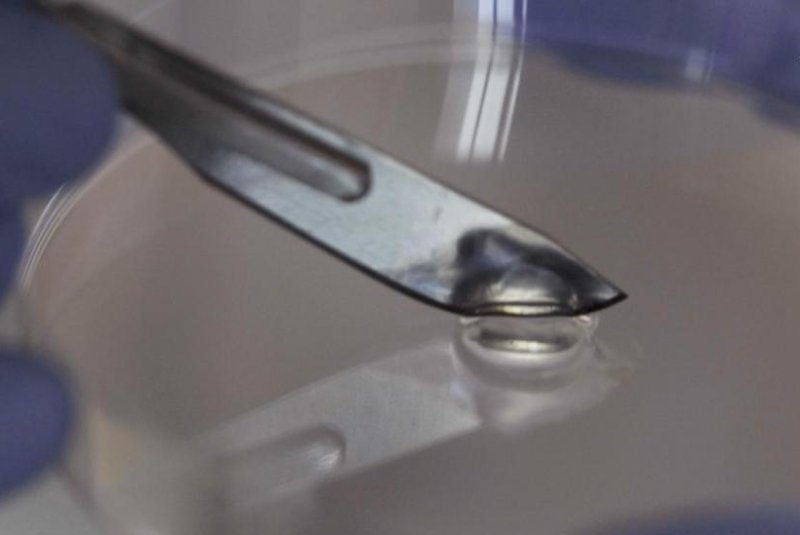When the new bacteriophage-filled gel is cut, the substance repairs itself. Photo by J.D. Howell/McMaster University
July 25 (UPI) -- Scientists in Canada have developed a novel gel jam-packed with bacteria-killing viruses. According to researchers, the self-healing gel could be used for a variety of applications in medicine and environmental protection.
Bacteria-killing viruses, called bacteriophages or phages, are the most abundant and diverse group of organisms on the planet, far outnumbering any other life form -- even bacteria.
Zeinab Hosseini-Doust, a chemical engineer and researcher at McMaster University in Canada, operates a lab where she focuses on finding solutions for infectious disease. In her lab, Hosseini-Doust grew, extracted and packed bacteriophages together at such a great density that they spontaneously arranged themselves into liquid crystals. When Hosseini-Doust added a chemical binder, the crystallized phages formed a gelatin-like substance that repairs itself when cut.
"Phages are all around us, including inside our bodies," Hosseini-Doust said in a news release. "Phages are bacteria's natural predators. Wherever there are bacteria, there are phages. What is unique here is the concentration we were able to achieve in the lab, to create a solid material."
Just a tiny pinch of the antibacterial gel, only a milliliter, contains 300 trillion phages. Researchers suggest the yellow-colored gel could be used to coat medical implants and artificial joints.
Scientists detailed the discovery the novel gel this week in the journal Chemistry of Materials.
For a variety of reasons, including the overuse of antibiotics, the problem of antibiotic-resistant bacteria continues to grow. Researchers all over the world are trying to find solutions.
"We need new ways to kill bacteria, and bacteriophages are one of the promising alternatives," said study co-author Lei Tan, a PhD student in Hosseini-Doust's lab. "Phages can kill bacteria that are resistant to antibiotics."
The new gel could be augmented for a variety of purposes. Because bacteriophage DNA can be easily edited, the viruses can be trained to attack cancer cells, eat plastics or counteract environmental pollutants.















